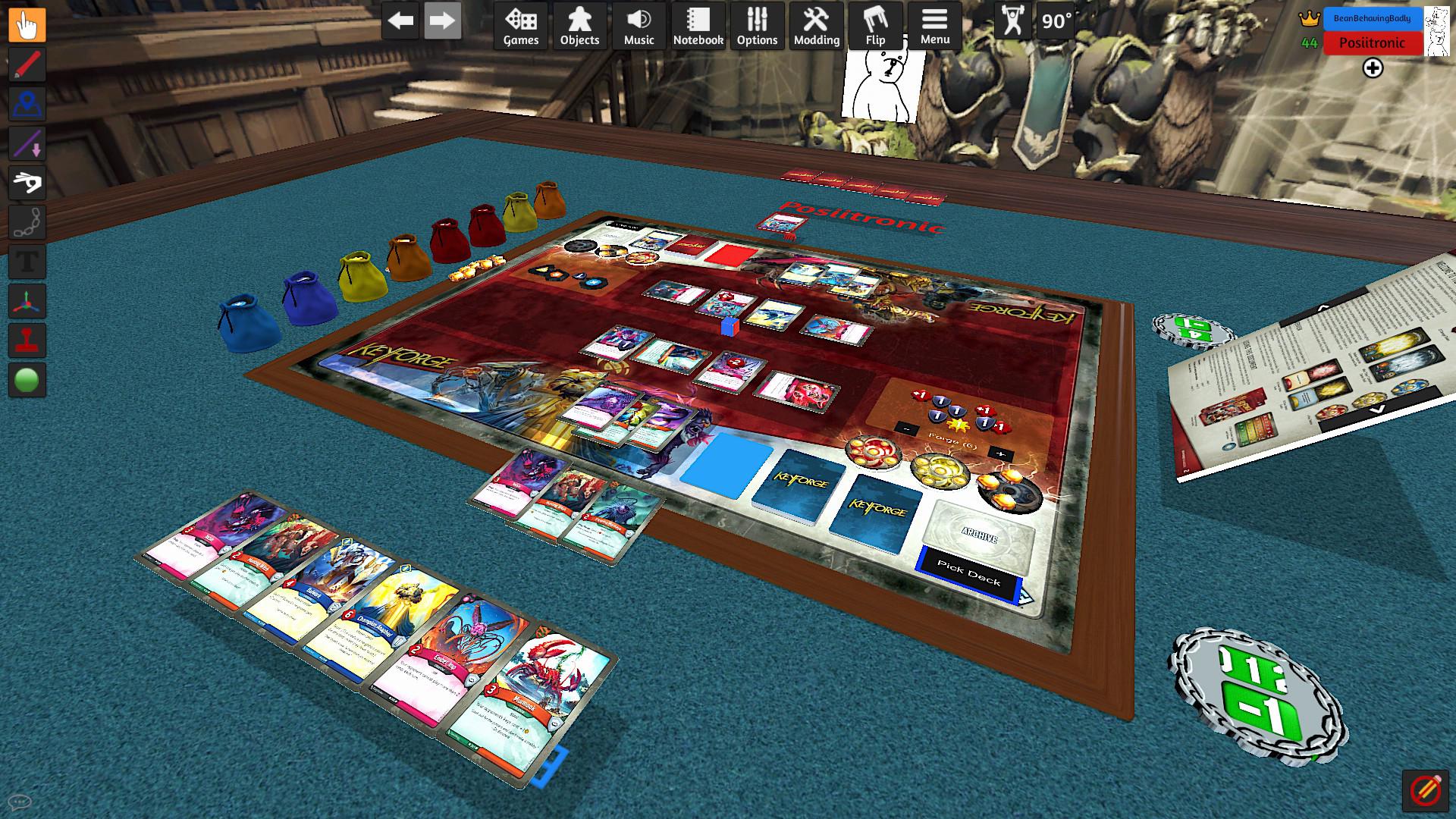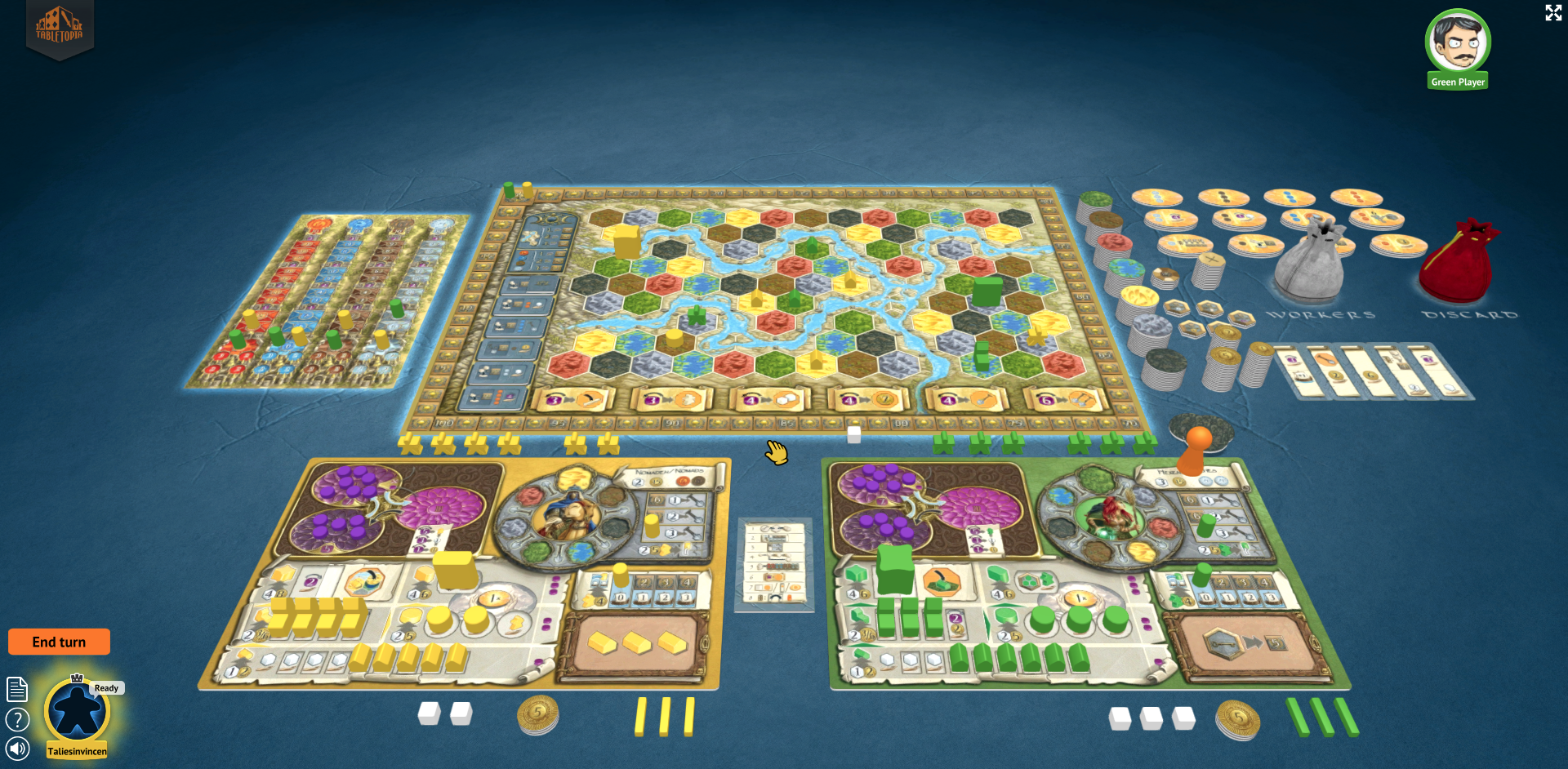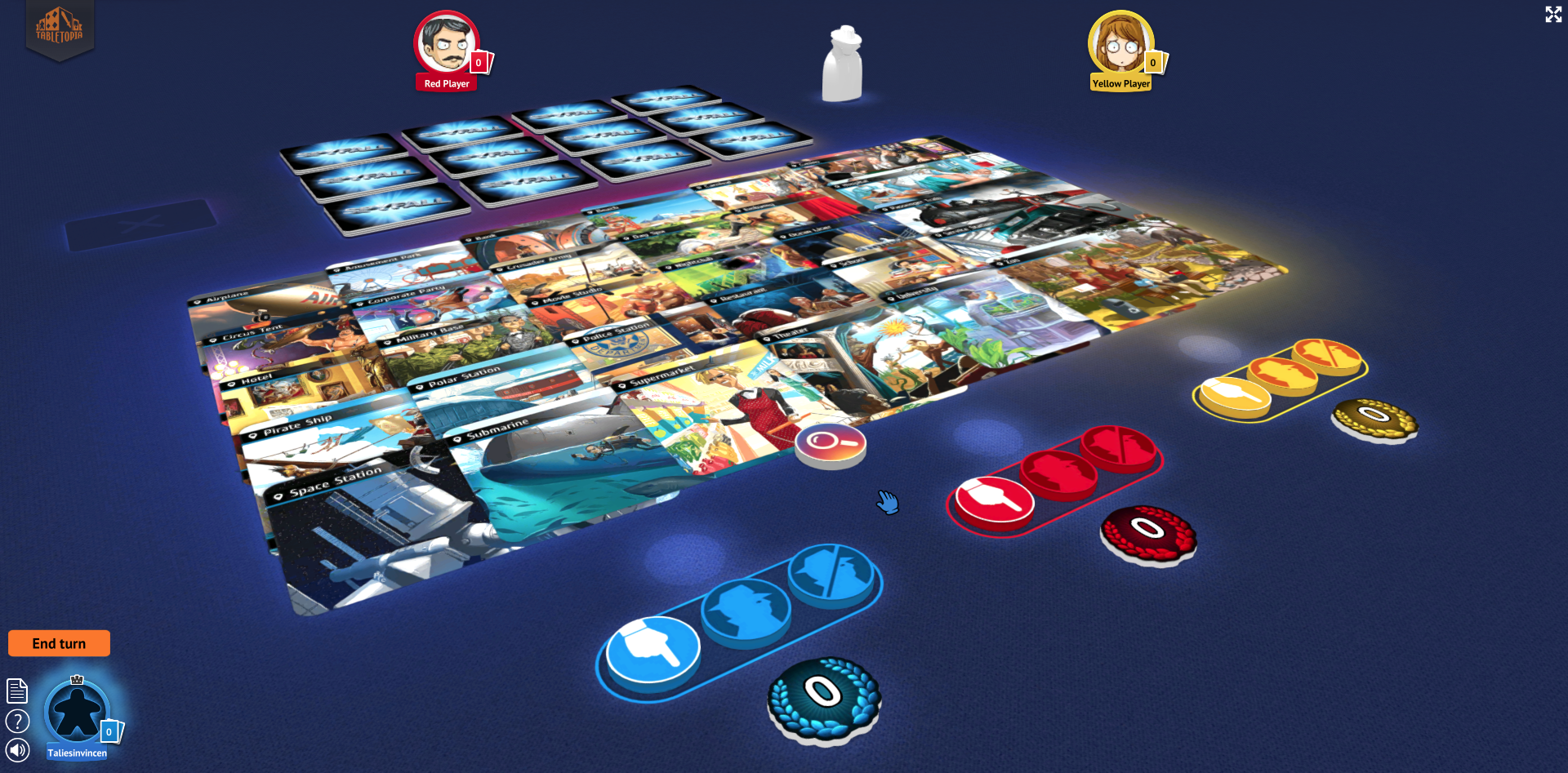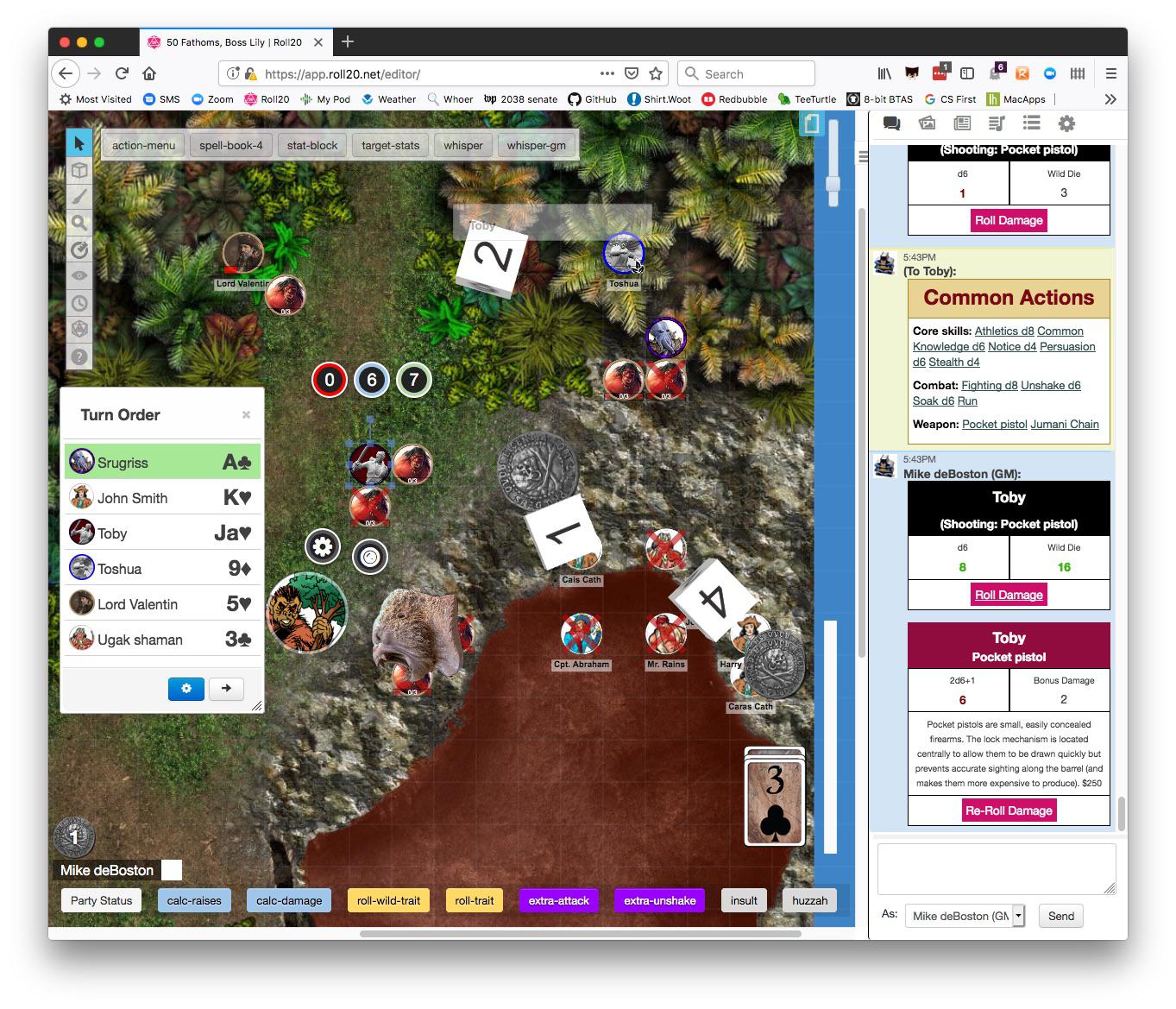Looking get started playing tabletop games online? - Here's our picks for the best digital tabletops
Allegiances forged with subtle glances across a board, the tension rising as players work together towards common goals, and a whole table erupting into excitement as grand plans are revealed, only to come crashing down just as quickly. It's no secret that the best part of playing board games is the people you play them with, and the moments you have while playing them often outclass the memories you'll have of the games themselves. So as we all waste away in quarantine, with masked dashes to the shops becoming the extent of trips outdoors, now is the perfect time to turn to digital tabletops to get our board game kicks.
With so many new
players looking for the best place to play their favourite tabletop
games and pen and paper RPGs, and an ever increasing amount of
software catering to different needs, I'll be taking a look at the
options players have available, and comparing how each one might be
able to help to have the most seamless experience taking tabletop
experiences online.
Tabletop Simulator - The big, messy everything sandbox (£14.99 on Steam)
No conversation about digital tabletops could ignore the titan that is Tabletop Simulator. Owing to an incredibly easy modding system that allows players to add anything from decks of cards to 3d models with one click, and then share those setups on the Steam workshop, Tabletop Sim offers a non-stop barrage of games that no other program on the market could hope to match. Whether it's a scanned version of a board game, or a fully sculpted battlefield for your miniatures to brawl on, everything in Tabletop Simulator is presented in a fully physics driven sandbox environment, which proves to be both it's best and worst feature.

It's clear from the get-go that this is the best way to recreate the physical presence of being sat at a table, as pieces sprawl out before you, and everyone immediately realise the havoc they can cause with the 'flip table' button. The free form space on offer here really does emulate being sat at a table with friends better than any other system, and goes the extra way to bringing back a sense of presence that's lost playing games over the internet. You can even see other players' avatars sat around the table, and see their digital hands moving and interacting in real time.
So far so good then. Tabletop Sim makes a great and immersive first impression, bringing a set of rules that's simple to interact with, but offers a lot of freedom and depth to set up a table however you want to, and when it works well with a game, it's a spectacular experience like nothing else, but there are definitely more than a handful of games that aren't suited to this very open approach; Card based and miniatures games work especially well here, to move a piece, simply click and drag it to where you want it to be, and it'll all work flawlessly, which only goes further to lend Tabletop Sim more of that people-at-a-table experience, with big, broad movements that are easy to see and read. Where it starts to falter though, is when the games get a bit more intricate, or require a lot of space.

There was never a time I thought it wouldn't be possible to load, or add a new game, no matter how many extra unique pieces it needed, but for especially finicky games, it can quickly become very difficult to navigate around the 3d space in an intuitive way, even with multiple camera controls available, and it quickly began to slow down my attempts to try out bigger games, where turns and actions can take longer as it is. That's not to say dedicated players wouldn't be able to work around this to play their favourite games, but for players looking to indulge in a Twilight Imperium or a euro game with a thousand pieces, they might be best off looking for something that will simplify the running of the game a bit.

It really can't be overstated just how much content is available for Tabletop Simulator, and how important that is for it's success. Just about any game imaginable is probably available on the workshop, from the latest big box releases to handmade custom games that aren't available anywhere else. There's even a handful of premium DLC offerings for popular titles. For the overwhelming majority of people looking to play a bunch of different board games over the internet with maximum immersion and minimal hassle, it's hard to go wrong recommending Tabletop Sim as the go-to option for board gaming online, so long as they don't mind buying it on Steam, and overlooking the somewhat dubious nature of the steam workshop, that has allowed a lot of paid games to be scanned and uploaded for everyone to play without any of the game's cost going to developers.
Is it right for me? - The most versatile option available for an authentic tabletop experience online. It might not be the most streamlined way to play, but it's without a doubt the best way to socially play games online, providing you're okay letting the games suffer a bit for that experience.
Tabletopia – The dev backed, ease of access option (Free with optional subscription)
If Tabletop Simulator was the crazy wasteland marauder camp of digital boardgames, then Tabletopia would be it's last bastion of civilisation. A valiant attempt to make sense of a difficult space, that lacks it's contender's anarchic freedoms, but brings with it a consistently better thought out experience for each of it's parts, while being both more accessible, and more conscious of the developers providing it's games.
At first glance, you'd be forgiven for thinking that there was very little difference between Tabletop Sim and Tabletopia, with the latter giving users a similar 3d space to play in, albeit with a little less visual polish; there are no physics with which to throw things around the table, or smooth animations for pieces moving around, but on closer inspection Tabletopia has a lot of smart ideas to make it easier and faster to start playing.

The first and biggest advantage of Tabletopia is that it's entirely web based, and while it can be played through Steam or on mobile devices, you can also just sign up on your web browser and start playing without having to download any additional software. This e
ase of use does come at the cost of the aforementioned drops in visual fidelity, but Tabletopia compensates for this exceptionally well with very clever options for interaction; For instance, you can set up different camera positions on the board, and save them to the number keys, so instead of having to scroll back and forth to look at what's happening, you can simply hit one button and see all the information you need. This dedication to having the smoothest experience possible extends to the games themselves too.
Tabletopia does offer a workshop with which you can create and share
your own games, in a similar, if not as intuitive, way as Tabletop
Simulator, but all of the content here is screened, and users can't
just upload versions of other people's games as their own, so it's
far from the main attraction, instead Tabletopia has the backing of a
lot of major players in board gaming, who have uploaded official
versions of their games that can either be played entirely for free,
or versions that only members who pay for the premium subscription
can access (The money for which is then split between the developers
of the games that any given player plays). While it might be more
expensive than just buying a piece of software over time, the
subscription prices are still great value, either costing $5 a month
to play the premium games, or $10 a month for a gold subscription,
which allows you to invite guests into normally subscription-only
games.

It's a great system, that not only means that game developers can have premium versions of their games playable online, but because they're uploading the games themselves, more care attention is put into each one. The developers set up their own ideal camera angles so you never even have to sort that out yourself and design the boards optimally before the game even starts so there's no fiddling about putting everything in the right place and pieces will even snap to their correct places on the table. What the software itself lacks in technical showmanship, it more than makes up for with the very best presentation for it's games.
While some more traditional online board games can get lost in complicated systems that have to be learned, and end up automating too much, and other 3D tabletops can make things fiddly to use for that hectic feeling of a real tabletop, Tabletopia has found an ideal space between the two; You'll still be moving 3d pieces around fantastic recreations of a mammoth selection of board games, but at the same time everything will just work how it's supposed to, and you'll never find yourself fighting with a camera to read a card, or struggling to keep track of dice that are flying around the table. And best of all there's no flip table button to worry about.
Is it right for me? - A wide range of official games and easy to use interfaces for playing them, along with a great business model makes Tabletopia an instant recommend for players who both want to sit down with some more complicated games, and also get that feeling of presence that makes tabletop gaming so special.
Roll 20 – The RPG player's first choice (Free, with optional purchases & subscriptions)
Roll20 is all about playing RPGs online. It's not designed to do anything other than give it's players a clean, simple environment in which to play pen and paper games, and it's had years of development poured into adding new features, and it now easily boasts the most comprehensive list of resources to automate things, regardless of what RPG system you're running.
So Roll20 is focused, it's free and it runs entirely in your web browser. This is all great stuff, and for a regular Game Master, it's a godsend. Having somewhere that will keep together all your maps, character sheets and handouts and keep your games running faster and smoother cuts out of much of the faff usually required to run pen and paper games. If every playgroup just wanted that clean way to make their game easier, it would be a lot easier to recommend Roll20 to everyone, but it definitely has some limits that are going to annoy some people a lot more than others.

The first and most obvious issue with Roll20 is that it's not especially pleasing to look at. Old school D&D fans might appreciate the 2D graph paper aesthetics and easy grid based layouts, but for the average user, Roll20 just looks like any other utilitarian website or early 2000s spreadsheet software. It's certainly not aiming to be another 3D space to play in. None of this is to say that you can't decorate your maps (in fact, it's as simple as dragging an image onto the page), but Roll20 is about systems above all else, and the players who want to just get on with storytelling and clear combat absolutely adore it, but the sort of player who spends hours before each session making intricate handouts and decorating the table will probably find the options on offer a little bit underwhelming. In my own experience, I've found that how well people took to Roll20 very much depended on not only who I was playing with, but also what game we were playing.
There's actually a surprising wealth of different games supported from the get go too, and while there's never going to be much getting in your way from playing whatever system you please, it's a nice touch to be able to just select what you're playing, and have the appropriate character sheets and functions ready to go. It's just that I found that for quite a lot of games, I didn't really need a lot of what Roll20 offers. Sticky grid based maps, and automated stat rolling is great for players of more combat focused games, and unsurprisingly OG Dungeons and Dragons is the feature piece here. Being able to go from describing the troubles and turmoil of a goblin's lair by dropping tokens onto the page, to clicking just one button to see different ranges and areas for spells, and then having everyone's initiative automatically sorted is fantastic for that setting, but for a slow burn, storytelling system like a Call of Cthulhu, or a Vampire: The Masquerade, I found that I wasn't using the screen for much more than showing pictures to my players, whereas with one of the 3D tabletop offerings, I might have been able to slide physical props across the screen, or add that extra level of detail to the scene.

Whether or not you'll like Roll20 is very subjective, and it doesn't do a lot of things wrong. Everything just works, and even when it's implementation isn't the best available, it's probably the easiest to use. For players looking for very specifically a way to play RPGs online, and who want something that makes combat and keeping track of the periphery of pen and paper games nicely tied together, it's excellent; just be aware that it does have certain limitations that stop it from being completely immersive. Even if Roll20 just does a simple thing incredibly well, it's even better value for players when it comes to price. You can buy extra art assets and maps in the store, but as mentioned above you can also just drag any image onto the screen and it will load, so there's never a feeling that you're missing out by not having it, and the same goes for the subscriptions. There are $5 and $10 a month tiers, with further discounts for yearly payers, but subscribers get more storage space for files and images, dynamic line of sight settings, and an ad-free experience. It's all nice stuff, but like the marketplace, it's incredibly fair, and even shares features between everyone in a group, so even if only one of your party is subscribed, everyone will get the benefits.
Is it right for me? - Roll20 set out to do one thing, make playing RPGs online easy and accessible to everyone and it does it fantastically. Don't go into it expecting the atmosphere of a shared 3D space, but more as a way to let the imagination and creativity of pen and paper games shine through, and if that's what you're looking for, you won't find much to dislike here.
VASSAL – Tactical wargaming for Linux lovers (Free, open source download)
Vassal is absolutely the most specialist option for playing board games that I've ever seen. Being entirely open source, there are a handful of modules for more casual games, but far and away the main use for VASSAL is to play programmable, automated adaptions of tactical and wargames (stemming from it's origins as a digital way to play Advanced Squad Leader, a notoriously complex squad tactics game). It needs a lot of learning, a decent helping of tech-savvy, and the patience to learn an unintuitive UI, but much in the same way Linux enthusiasts appreciate the levels of technical control they have over their operating system, VASSAL diehards wouldn't have it any other way.

What sets VASSAL so far apart from it's competition, is not only the non-existent cost of entry, but also the ability to manually program and automate a lot of the calculation work that would otherwise be a job of it's own to keep track of online. For intimidating games like Twilight Struggle, with a lot of different phases and statuses to keep track of, the idea of being able to let VASSAL handle all of the work, so you can stay focused on the game and speed things up, can make the thought of playing such long games far less stressful. The dedication to making technical games as playable as possible doesn't end with automating actions either, as a constant log on the screen will be able to remind you of any actions that have taken place, and even explain if a move isn't legal, which, combined with the ability to play games by email, logging in and taking your turn whenever you have the time, makes VASSAL the very best way to play the most complex and time consuming games on the market, providing you're willing to learn it's systems first.
For a program that can be very abrasive to it's users from the word go, VASSAL also compensates by putting community front and centre. Because all of it's games are community developed, the creators behind their digital adaptions are more than likely active on the forums, or the included IRC chat, and there's a very strong sense of community, be that groups improving each other's modules to make the best games they can, or just helping new players get to grips and learn the ropes. Whereas the full digital tabletops do have server browsers to find other people's games, they're just that, and despite VASSAL having some problems drawing players in with flashy graphics and steam friends support, from my own experience it also has some of the most helpful players, who are incredibly passionate about the games that they play, and were more than happy to teach their favourite games, and not just throw cards across the table.

The comparisons to Linux computers definitely swings both ways for VASSAL, for every well made module that makes playing difficult games a breeze, there's another that's probably unfinished and abandoned. It's tools for creating your own games are deep and powerful, but also not nearly as easy to use as other offerings, and will probably be a turn off to players of simpler games that don't need a whole set of different rules to be calculated every turn, and the complexity of the software itself is enough that games can't just be opened and played without learning what everything does (or more likely, having a more experienced player walk you through it). At first glance, VASSAL might seem incredibly off-putting and hard to use, but at the same time, I can't imagine any other digital board game software being able to replicate the sheer technical scale of the games on offer here.
Is it right for me? - If you're looking to wade in to the world of wargaming and high strategy games, the kinds of games that can be played over a week and have instruction manuals longer than some books, you'll probably find yourself right at home and among similar minds with VASSAL. Like the games themselves, the learning curve is steep, but the massively customisable and detailed engine will likely delight the sort of players it's most popular games attract.
Just play the digital versions – Just play one game (mostly) without issues
I won't be spending too much time on official digital versions of games here, as they don't really fit the criteria of a digital tabletop, instead focusing on being video game versions of the rules of popular games more so than emulating the in person experience of tabletop, but it's hard to ignore the popularity of digital versions of games, especially when it comes to streaming.
All of the big three of trading card games (Pokémon, Magic the Gathering and Yu-Gi-Oh), have complete digital versions of their games, which usually stay up to date, or even ahead of their paper sibling's releases. These are by far the easiest way to play these games, and also offer great learning tools to draw in new players to their ever evolving rules and new sets, but the biggest caveat here is the complete lack of human interaction, and it can easily feel like you're just playing a game against a computer.

Despite digital TCGs lacking a social aspect, they're still commonly
found in top viewed games streamed on twitch, without even mentioning
Hearthstone, and Legends of Runeterra, which only exist in
digital form, and it's easy to see why they're so much more popular
than the full digital tabletops. If you're trying to stream a game
while interacting with an audience, there's no denying how helpful it
can be to have the simplest, most well optimised way to play without
having to use more complicated software, so, for people looking to
watch a game, and be able to get involved with chat and get a sense
of community that way, official digital adaptions can be a great way
to go, but beyond all of the flashy graphics and smooth gameplay,
don't go in expecting it to feel like sitting down with friends to
play the same game.
Outside the world of TCGs and live-service games, Asmodee games, a publishing powerhouse in board games, also have a digital team, who have brought fantastic digital versions of such games as Catan and Ticket to Ride (among many others), and while some of these can fall into the same trap of feeling like a video game following a board game's rules, losing that multiplayer focus in the process, they're also the best of the best of production values, and bring their games to life with unmatched passion, whether that's a full console version of a game, or the same thing running on your phone. It might be a hard sell to get a group of friends to all buy a digital version of a game so you can all play together on your phones, but if you didn't have access to a physical version of a game, and just wanted something quick to play together that works well, Asmodee Digital's games would be the best way to do that.

Is it right for me? - Do you have that one game that you just can't get enough of? That you love the gameplay or the deck-building and just need a way to get more of that without having to sit through setting up a tabletop and adding all your pieces by hand? Or maybe you just want something simple and more visually engaging to draw an audience into your streams? If so, seeing if your favourite game has a digital adaption might be the way to go.
So many ways to play, and that's not it.
So there are a range of different options available for playing your favourite board games online, and a range of different experiences on offer depending on your preferences, and these have only been some of the major offerings. With so many different choices, hopefully this has managed to narrow them down, and help you to pick out the way to play that's right for you.
But what if none of this sounds like it's close enough to that tabletop experience for you? What if you're the sort of person who needs to have real cards in your hands, and a board spread out in front of you? Keep an eye peeled here, as I'll be going down the rabbit hole of the players who are playing physical games over webcams, with elaborate camera setups and video calls to get as close to the feeling of a real table as they possibly can.
